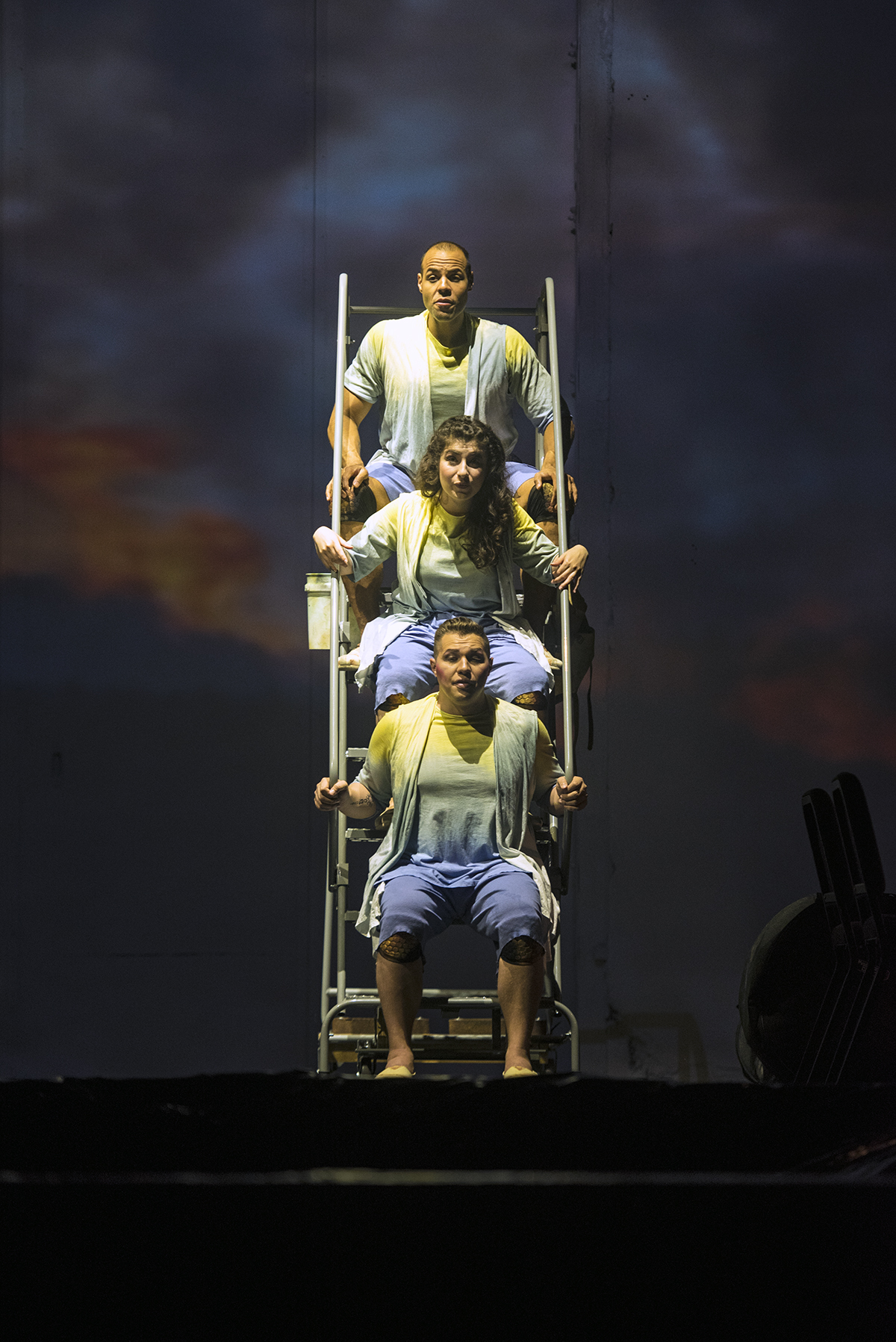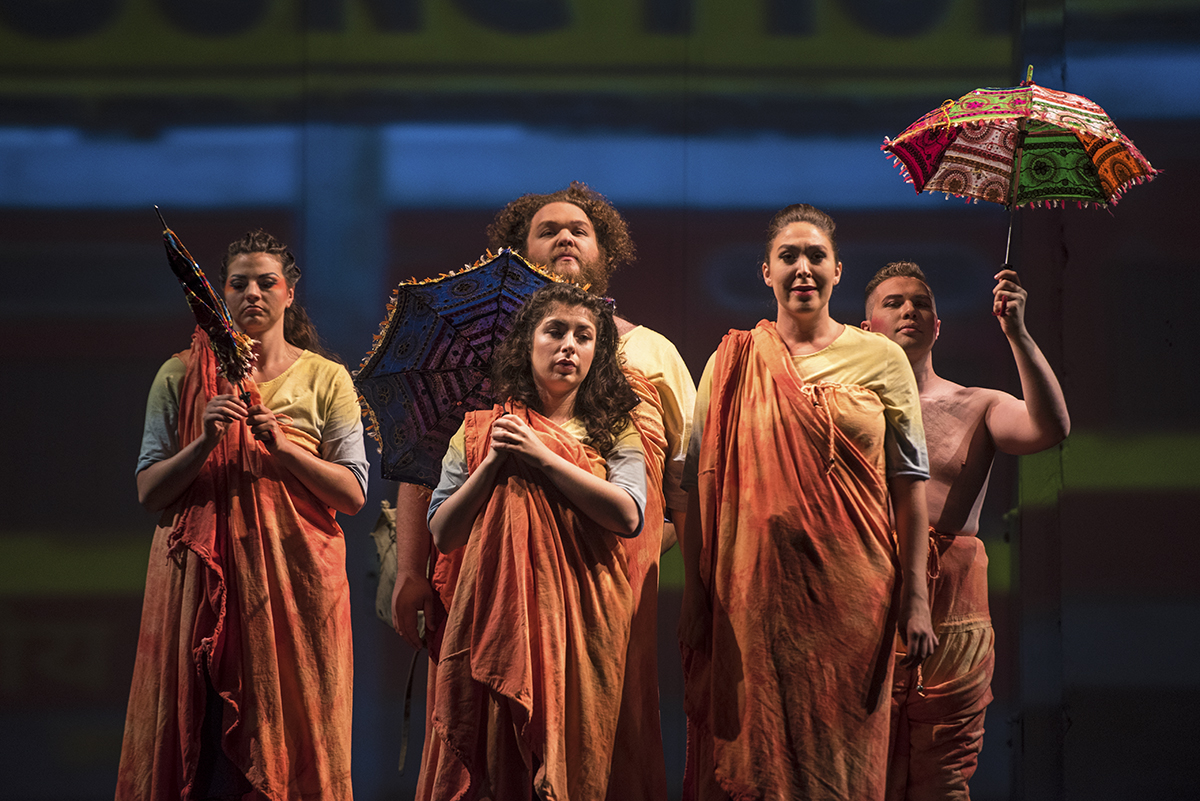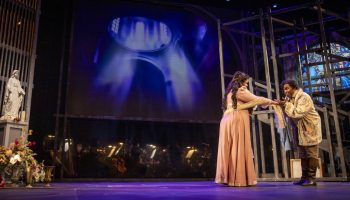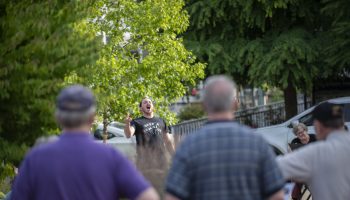Hydrogen Jukebox represents an ideal presentation for the Chautauqua Opera Company — a provocative contrast to its more standard repertory. With modest staging demands, six excellent voices from the company and a seven-piece instrumental ensemble, and the company’s General and Artistic Director Steven Osgood conducting from one of the two electronic keyboards, it’s a practical as well as imaginative choice. Given at Norton Hall Thursday evening, it will be repeated at 4 p.m. Tuesday.
Allen Ginsberg’s poetry is the key to the work, set by composer Philip Glass after meeting the beat poet in an East Village bookshop in 1988. They began work on a small piece which generated into this full chamber opera (a designation that Glass has changed his mind about several times), choosing text from 20 of Ginsberg’s varied poems, necessarily projected on a wall. Therefore there’s no real narrative, but wide leaps from one raging insight to another.
The work’s title comes from a line in Ginsberg’s famous 1955 poem “Howl,” a rambling chant railing against the governmental, military, sexual and sociological changes he anticipated. “Howl,” and much of the Hydrogen Jukebox libretto, is either a drug-induced hippie-era stream-of-consciousness collision of metaphors, with passionate protest against war, the ongoing materialist culture and imagined social restrictions in general, or a masterpiece of visionary anticipations, through bursts of revelatory, colorful prose images about the inequities looming in an inevitable future. You have to decide for yourself.
Hydrogen Jukebox was the seventh of Glass’ 28 operas so far, which have tapped a formula to grand success. His repetitive, rhythmic palette has always seemed to this listener to be mostly effective as accompaniment to a film or visual production. Standing alone, it can either lull some into a hypnotic ecstasy, or get on one’s nerves. But as an underpinning to something visually interesting, it has become a tremendously successful device; it undulates to support the ensemble as a kind of sonic carpet you sometimes notice only subliminally, and the musicians kept flowing those continual, insistent intervals and arpeggios throughout.

Much of the text is declaimed rather than sung, and there are several places where Glass actually wrote a melody; they came in several wordless sections by female singers, and in the stirring a cappella “Father Death Blues” (without projected text) at the work’s close. The six singers — sopranos Chelsea Friedlander and Helen Hassinger, mezzo Natalie Rose Havens, tenor Eric Wassenaar, baritone Mario Diaz-Moresco and bass Evan Ross (all 2017 Chautauqua Opera Company Apprentice Artists) — did splendidly in conveying the spirit of the text while always moving in different patterns.
The staging by Cara Consilvio kept the cast, first appearing in fuchsia robes, constantly ascending and descending two movable stairs of different heights, with their tops sometimes used as podia. Though there were things going on all the time, and costumes changes often onstage, everything seemed quite organically designed. Video projections were used occasionally, but tellingly, to offer clues.
Born in 1926, poet Allen Ginsberg lived through many traumatic events in his lifetime, and foresaw what he conceived as the fall of America. His poetry intended to reverse this perceived limiting of personal freedoms through peace, Eastern religions, drugs and the sexual revolution; lots of others in the hippie culture embraced these disciplines, but Ginsberg wrote with flaming passion to express them. Two sections when the singers exclaim “Who sent us here?” and “I claim my birthright” opened the door to a discovery of his core meaning.
He didn’t want anyone to be indifferent to his poetry — you can vibe with it, be bewildered or even be riled — but it surely leaves a powerful impression. Some sections in the opera push the bounds of poetry, with nearly random, virtually nonsensical juxtapositions of descriptive words which somehow mysteriously flow in a musical way.
In descriptions of 1962 Calcutta, Kansas and the Midwest, and an embarrassing visit to his Aunt Rose and his father in Newark, the prose is suddenly taut and evocative. Moloch arrives as a symbol of decay and destructive energy, and in other places politics, enemy gods, drugs and squalor were text choices probably made for their adaptability for interesting staging.
So what do the creators and performers want us to take away? The destructiveness of religion, a decaying modern society, fear of atomic weapons or a prophesied apocalypse, complete with martian UFOs? Perhaps it asks for just an awareness of anticipated technological quicksand and our complacency about it, or just to shake us up and make us react — which is what theater is supposed to do.
It’s hard to imagine an interpretation of this work which would be more effective. Osgood and his team has done something unique, giving us a highly imaginative production to talk about, think about, argue about. Everyone will leave Norton Hall with a different spin, so put a coin in this Jukebox and see if you can recognize the tune.
Tom Di Nardo has been a longtime arts writer for the Philadelphia Daily News. His recent books include Listening To Musicians: 40 Years of the Philadelphia Orchestra and Performers Tell Their Stories: 40 Years Inside the Arts. He has also written Wonderful World of Percussion: My Life Behind Bars, a biography of legendary Hollywood percussionist Emil Richards.





